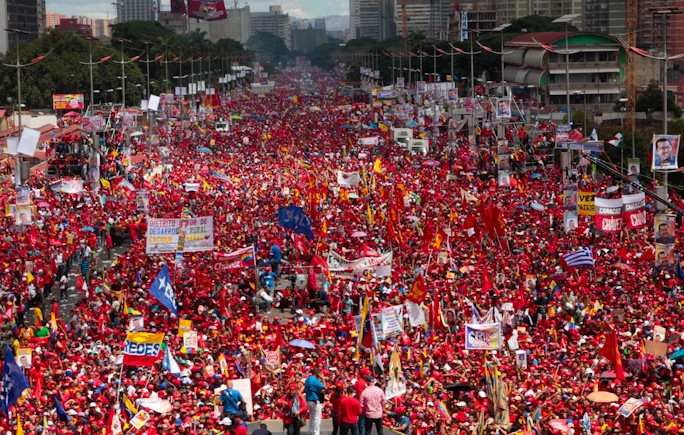Today’s election in Venezuela is vitally important, and almost everyone expects a relatively close result (at this hour, as the polls close, both sides say the are expecting victory based on exit polls.) Anyone concerned about social justice should be hoping for Hugo Chavez to win against challenger Enrique Capriles.
Despite its many contradictions, shortcomings and problems, the ‘Bolivarian Revolution’ has unarguably changed Venezuela and all of Latin America for the better. A defeat for Chavez today would be a defeat for the left the world over. A defeat for Chavez would be a victory for neo-liberalism and imperialism, twin evils that have been significantly pushed back across Latin America in recent years.
I would hope this would be a rather uncontroversial assessment of what’s at stake in this election, but then the world sees Venezuela mostly through the distorted lenses of mainstream media. If not outrightly hostile, coverage tends to omit crucial facts and context.
The Globe and Mail‘s article previewing today’s presidential election in Venezuela is typical of most mainstream press coverage in North America. Despite a word count of 950, the words “coup d’etat” are absent.
It’s impossible to understand what’s at stake today without reference to the coup d’etat that briefly toppled Chavez on April 11, 2002. In one of the most stunning and inspiring turnarounds in modern political history, the people of Venezuela intervened to defeat the coup. (The documentary The Revolution Will Not Be Televised tells this remarkable story, explaining the central role private media manipulation and lies played in making the coup happen.)
The past decade might have turned out quite differently in Latin America if Chavez had been killed and ‘el proceso’ of political and economic change cut tragically short. The pink tide that swept progressive governments into power in country after country and allowed for real gains to be made by social movements might have receded quickly. Institutions like ALBA that have united Latin America and demonstrated a concrete alternative to neoliberal ‘trade’ agreements and investment regimes would never have gotten off the ground.
The Globe and Mail piece, it’s worth noting, also doesn’t mention the 2009 coup against Chavez’s Honduran ally Manuel Zelaya and this year’s “constitutional coup” against Fernando Lugo in Paraguay — both these governments were members of ALBA.
For further reading on today’s election, I would suggest this piece in The Bullet, in which Steve Ellner explains that a Chavez win would provide a mandate for deeper political and social change:
A Chávez victory in October will mean further deepening of change in Venezuela. New expropriations will create a mixed economy in important sectors stimulating competition between public and private companies. Chávez’s proposals for 2013-2019 call for state incursions into commerce and transport, to the detriment of middlemen, through the creation of ‘centres of local distribution for the sale and direct distribution of products.’
Another far-reaching goal outlined in Chávez’s electoral platform is the expansion of the power of community councils. Several hundred ‘communes in construction’ group a dozen or more community councils each to undertake projects covering a wide area, such as gas and water distribution. Chávez proposes to promote the creation of new communes to represent 68 per cent of the population. The communes are to be granted the same prerogatives as state and municipal governments, including budgeting, participation in state planning and, eventually, tax collection.
A Chávez victory will feed into the ‘left tide’ in Latin America at a critical moment and will undermine U.S. influence.”
For historical context on the continental struggle for democracy and socialism, and an exploration of how past coups like the tragedy of Chile have influenced the contemporary left in Latin America, you can’t do better than this recent essay by Greg Grandin in the London Review of Books.
On Twitter tonight, the highly polarized discussion is already buzzing. For the pro-Chavez line you won’t get in the mainstream, Eva Golinger (@EvaGolinger) is a prolific and influential source. Owen Jones (@OwenJones84) is a democratic socialist writer who observed today’s voting and is providing frequent updates as well.



